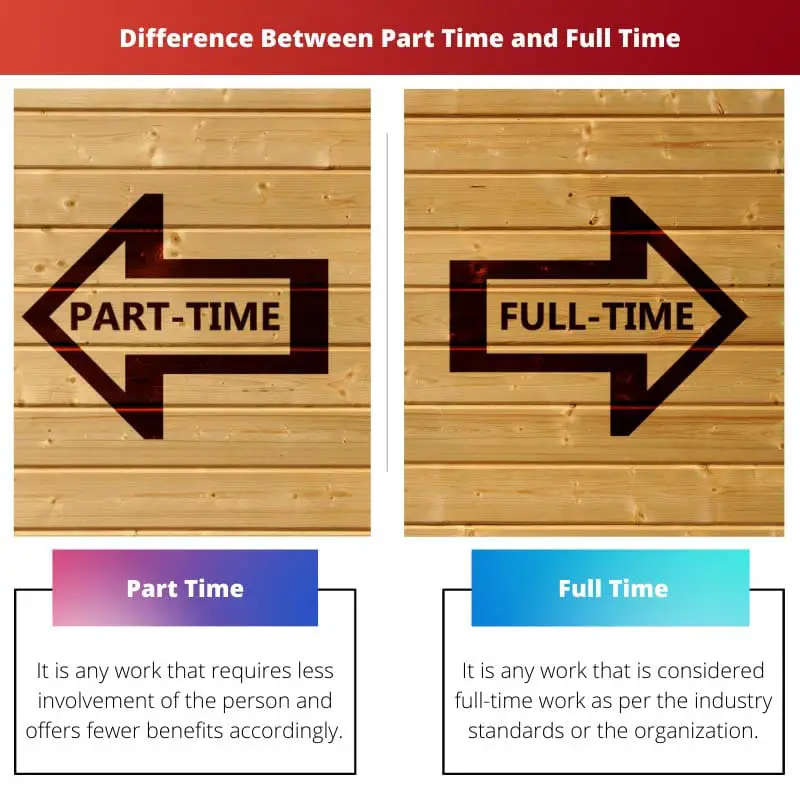When a person works for another person or company, the work is termed as his job. But depending on multiple features, the nature of this job is determined. By nature, here we mean the time frame and other necessary conditions and their applicability to a person’s job or employment.
Depending on the circumstance, the two most popular forms of the job are part Time and Full Time. The difference between them lies in their hours, perks and monetary benefits, etc.
Key Takeaways
- Part-time employees work fewer than full-time, less than 30-35 hours a week.
- Full-time employees receive more benefits, such as health insurance and paid time off, than part-time workers.
- Part-time jobs offer more flexibility, while full-time jobs provide more stability and opportunities for advancement.
Part Time vs Full Time
The difference between Part-Time and Full Time is that the former denotes work where work hours get reduced, by up to 50%. While in the latter the work hours get increased for almost double. Apart from the difference in duration, these two differ in terms of their perks, regulations, locations, and many more aspects upon which this article shall focus.

On the contrary, Part-Time is any work that requires less involvement of the person and offers fewer benefits accordingly. It might be a part-time job requiring the person to devote anything between 2 hours to 8 hours a day, or it can be a part-time course allowing remote education.
These conditions are nowhere specified and totally vary from place to place. One thing which remains constant is that a part-time requires less involvement than a full time does.
A Full Time as the name itself suggests is any work that is considered full-time work as per the industry standards or the organization. It might be a job, a course, or any such thing related to skills.
People working full-time happen to be eligible for certain receivables from the end of the organization, and people studying full-time are also supposed to fulfil certain duties.
Comparison Table
| Parameters of Comparison | Part Time | Full Time |
|---|---|---|
| Meaning | It is any work that requires less involvement of the person and offers fewer benefits accordingly. | It is any work that is considered full-time work as per the industry standards or the organization. |
| Time duration | It has a less time duration compared to the full time. | It has more hours as the time duration of the performance. |
| Salary | The salary happens to be based upon the amount of work usually | A full-time salary as per the industry standards is given for full-time work. |
| Duties | A part-time work entails a small set of duties or functions. | A full-time work entails a complete set of duties or functions. |
| Other benefits | Benefits which are given to the full-time workers are not given to part-time workers. | health insurance, transport allowance, pension plans. Etc. are given to a full-time person. |
What is Part Time?
Part-Time can be defined by the name itself. It refers to any work or course which is joined for a less duration as compared to its full-time version. It can be a job, an academic course, or any skill intended to be learned.
The ideal time duration of part-time work is not explicitly defined anywhere, but looking at the ongoing practices, it ranges somewhere between 2 hours to 8 hours daily.
However, this duration can be weekly, monthly, or season-wise as well. In a normal course, part-time work does not entail those benefits which are obtained by a person working full-time.
But with the changes in time, some companies have started giving certain benefits to all their employees despite them being part-time workers.
A person may work in a company part-time, or a person may study for a course part-time. Certain examples are-
- A student has joined a designing course which he attends for 1 lecture every day. This will be entitled to part-time work only.
- A person works from home for a company where he designs posters for them. he receives $10 for each poster and works only on weekends.

What is Full Time?
The term Full-Time is nowhere defined precisely but keeping in mind the industry trends and practices, it can be defined as a job that requires the employee to work somewhere between 35 to 40 hours in a week.
However, this stipulated time frame is subject to many variations depending on various industries and countries, but it can be understood by a specific point of 40 hours plus or minus.
But the number of hours is not the only thing by which this term can be defined. In terms of job or employment, hours are accompanied by other factors such as perks received, salary received, and other things.
But in terms of education or any other field, it can be explained as a phenomenon in which the complete involvement of a person is required.
This term can better be understood by the following examples-
- A person employed in a company works 9 hours a day and receives 2 paid leaves in a month along with 4 sick leaves. He is paid $5000 a month and receives health insurance from the company.
- A student has joined a liberal arts course and attends 5 lectures daily.
(In both of the examples mentioned before, these people are doing things full-time.)

Main Differences Between Part Time and Full Time
- It is any work that requires less involvement of the person and offers fewer benefits accordingly. It might be a part-time job requiring the person to devote anything between 2 hours to 8 hours a day. A Full Time as the name itself suggests is any work that is considered full-time work as per the industry standards or the organization.
- For a part-time job, a person might work between 2 to 8 hours, and for a part-time course etc., a person might attend it weekly or a few hours a day. But for a full time, job a person might work up to 8 hours or more, and for a full time, course a person shall attend full classes daily.
- The salary in Part-time work happens to be based upon the amount of work usually. However, it might be pre-determined as well. But for Full-time work, a full-time salary as per the industry standards is given.
- Part-time work entails a small set of duties or functions. In contrast, full-time work entails a complete set of duties or functions.
- Certain benefits such as health insurance, transport allowance, pension plans. etc. are given to a full-time person, which is not given to a part time person.

- https://journals.sagepub.com/doi/abs/10.1177/1071791907308053
- https://link.springer.com/chapter/10.1007/978-3-319-13144-3_49

It is also important to understand that the regulations around part-time and full-time employment differ based on various factors, including location and industry.